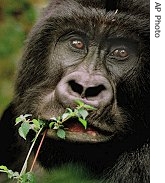A new assessment of Africa's massive Congo Basin rain forest finds that it is less degraded than environmentalists feared. The findings were announced in Paris, where African and Western officials ended a two-day conference Friday on an international initiative to conserve this rare, tropical forest.
The conservation project is considered the first of its kind for Africa. It is supported by six African countries, with backing from European and American governments and non-governmental organizations.
 |
| A mountain gorilla chews foliage in Virunga National Park in far eastern DRC (file photo) |
Illegal logging, poaching and development have taken a toll on the rain forest. But officials meeting in Paris this week announced that a newly finished profile of the Congo Basin shows it is in better shape than they thought. The two-day conference aimed to assess progress in conserving the tropical forest, four years after the partnership was launched.
Among the measures introduced to help sustain the forest is a certification system for timber, so buyers know it has been harvested in an environment-friendly manner. So far, only three percent of the region's wood is certified, but officials say they expect the new system to spread rapidly. France also signed a special debt reduction package with Cameroon this week, which, for the first time, includes forestry and other environmental initiatives as part of the agreement.
 |
| Jane Goodall (file photo) |
"The question was, how do I feel at the end of the conference? Tremendous hope in the fact that these conferences are happening, in the fact that the Congo Basin forest partnership exists, and it is moving ahead," she said.
But some environmentalists argue too much of the Congo Basin forest will be open to logging, and that the initiative places too little emphasis on conservation efforts. The critics include Illanga Itoua, African forest campaigner for Greenpeace International.
"The basic vision of the Congo Basin they are putting forward does not, and will not, allow them to protect biodiversity and fight poverty," she noted. "Because the activities they have chosen to take place within that landscape are almost exclusively destructive and degrading activities, such as logging, and then with a small place to conservation and very little place for the people of the Congo Basin."
Funding is another problem. The United States, France and the European Union have pledged $700 million toward the conservation effort. But African officials say their conservation strategy will cost roughly $1.5 billion to put in place over the next 10 years.
Related articles
- • European Union Sanctions Rwanda and M23 Officials over Congo Conflict (March 17, 2025)
- • Canada and Germany Impose Sanctions on Rwanda for Supporting M23 Rebels (March 4, 2025)
- • European Union Suspends Defence Consultations with Rwanda (February 24, 2025)
- • Jean-Pierre Bemba named MLC presidential candidate (July 13, 2018)
- • DR Congo: The country that knows how to beat Ebola (December 11, 2014)
- • Denis Mukwege Wins Sakharov Prize 2014 (October 21, 2014)
- • Ebola Epidemic Resurfaces in DR Congo's Equateur Province (August 25, 2014)
- • New DR Congo amnesty law welcomed by UN envoys (February 5, 2014)
- • Congo Army Takes Control of Mbuzi Hill From M23 Rebels (November 4, 2013)
- • UN Security Council debate focuses on peace efforts for Africa's Great Lakes region (July 25, 2013)
- • Claims that threat to Congo Basin forest is waning are misleading (July 22, 2013)
- • Deforestation Slows in Congo Basin (July 22, 2013)
- • Widespread abuse of logging permits opens up Congo's forests to more destruction (October 25, 2012)
- • At high-level meeting, Ban urges political solution to crisis in eastern DR Congo (September 27, 2012)
- • DR Congo, IMF to Co-Host Conference on the Management of Natural Resources (March 13, 2012)
- • African Rainforests Continue to Face Challenges (January 6, 2012)
- • Tshisekedi Says He Won, Can He Prove It? (December 17, 2011)
- • Kabila Leads Partial Election Results (December 3, 2011)
- • Candidates to Make Last Stand in Kinshasa before Monday's Election (November 26, 2011)
- • European Union to observe presidential and legislative elections (October 19, 2011)
- • UN advises prudent use of abundant resources to spur development (October 10, 2011)
- • 19,497 Candidates to Run for 500 Seats in Parliament (September 26, 2011)
- • Kabila Makes Re-Election Pitch in Speech to the Nation (September 15, 2011)
- • At least 50 Dead after Two Boats Collide on Ruki River (July 29, 2011)
- • EU, DR Congo Sign Elections Funding Agreement (June 25, 2011)
- • Global Witness welcomes DR Congo's decision to publish resource contracts (June 3, 2011)
- • Kabila, Sassou meet in Kinshasa over security (April 16, 2011)
- • Upcoming UN-backed summit to focus on sustainable management of rainforests (April 13, 2011)
- • DR Congo Recalls Ambassador to Brazzaville (March 26, 2011)
- • DR Congo blocks oil search in Virunga National Park (March 18, 2011)







